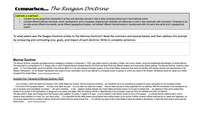Question

Transcribed Image Text:Comparison... The Reagan Doctrine
COMPARE & CONTRAST...
Compare diverse perspectives represented in primary and secondary sources in order to draw conclusions about one or more historical events.
Compare different historical individuals, events, developments, and/ or processes, analyzing both similarities and differences in order to draw historically valid conclusions. Comparisons can
be made across different time periods, across different geographical locations, and between different historical events or developments within the same time period and/ or geographical
location.
1.
2.
To what extent was the Reagan Doctrine similar to the Monroe Doctrine? Read the summary and excerpt below, and then address this prompt
by comparing and contrasting eras, goals, and impact of each doctrine. Write in complete sentences
Monroe Doctrine
The Monroe Doctrine, (originally expressed during a message to Congress on December 2, 1823), was written mainly by Secretary of State, John Quincy Adams, during the presidential administration of James Monroe.
This document is a comerstone of U.S. foreign policy in which President Monroe declared that the Old World and New World had different systems and must remain distinct spheres. The Monroe Doctrine made four basic
points: (1) The United States would not interfere in the intemal affairs of or the wars between European powers; (2) the United States recognized and would not interfere with existing colonies and dependencies in the
Western Hemisphere; (3) the Western Hemisphere was closed to future colonization; and (4) any attempt by a European power to oppress or control any nation in the Westem Hemisphere would be viewed as a hostile
act against the United States. (source: Encydopedia Britannica)
Excerpts from Transcript of Monroe Doctrine (1823)
.as a principle in which the rights and interests of the United States are involved, that the American continents..are henceforth not to be considered as subjects for future colonization by any European powers...
.. In the wars of the European powers ... we have never taken any part.. It is only when our rights are invaded ... that we resent injuries or make preparation for our defense. With the movements in this hemisphere we
are of necessity more immediately connected.. We owe it, therefore, ..to the... relations existing between the United States and those powers (in Europe) to declare that ... any attempt on their part to extend their
system to any portion of this hemisphere as dangerous to our peace and safety. With the existing colonies or dependencies of any European power we have not interfered and shall not interfere...
The late events in Spain and Portugal show that Europe is still unsettled. Our policy in regard to Europe..is not to interfere in the internal concerns of any of its powers; .to cultivate friendly relations with it, and to
preserve those relations by a frank, firm, and manly policy... It is impossible that the allied powers should extend their political system to any portion of either continent without endangering our peace and happiness; nor
can anyone believe that our southem brethren (South and Central America would choose this), ... It is still the true policy of the United States to leave the parties to themselves, in hope that other powers will pursue the
same course.... (source: Avalon.law.yale.edu)
Expert Solution
This question has been solved!
Explore an expertly crafted, step-by-step solution for a thorough understanding of key concepts.
This is a popular solution
Trending nowThis is a popular solution!
Step by stepSolved in 3 steps
